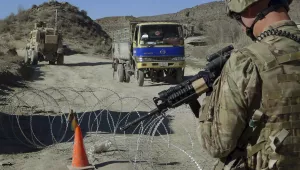Like many American citizens, I am deeply concerned about instability in Afghanistan and Pakistan (with its nuclear arsenal and terrorist groups) but worried that our habitual failure to understand the history and culture of nations unlike our own will severely impair if not doom our efforts.
Like many Americans, I do not have sophisticated knowledge or expertise about these two nations. And I look to a new administration to make a compelling and realistic case for our goals, strategy and investment in nations where our influence---even with the intense involvement of the U.S. and whatever allies it can bring along with it----may be very limited because of deep-seated local and regional forces.
The recent Obama Administration review of U.S. policy in Afghanistan and Pakistan stated that the "core goal of the U.S. must be to disrupt, dismantle and defeat al- aeda and its safe havens in Pakistan, and to prevent their return to Pakistan or Afghanistan."
In Afghanistan, the administration seeks to combine efforts to neutralize the Taliban and prevent instability with efforts at economic development and good government to strengthen Afghan society. This is the "modern" approach of seeking a tie between our geopolitical interests and the interests of the local people.
One critical question that the administration needs to answer is how many resources should be devoted to development and governance, relative to direct military activities in the effort to at check-mate the Taliban and keep al-Qaeda from returning to Afghanistan?
Most important, what do good governance and economic development mean, when broken down into real objectives; how will these processes of economic and social change take place; by whom; over what period of time; how will progress along the route of change be measured?
Obviously, there is reason for some serious questioning about "nation-building" in Afghanistan, one of the world's poorest states. To list a few reasons: the main crop is used for illicit drugs; the government is notorious for corruption; the "nation" is comprised of a complex network of tribes and ethnic groups; institutional infrastructure is lacking that can attract foreign investment.
Despite the grand rhetoric of "good governance" and "economic development," is our real goal just anti-Taliban action through military means and making alliances and dispensing favors to a fragmented tribal/ethnic nation?
The American public is not focusing on Afghanistan today. But, despite a lack of national debate, the administration is making decisions that make Afghanistan its issue---and potentially its very messy problem.
President Obama has softened the Bush rhetoric of a "prosperous and peaceful democratic Afghanistan" and stated that the U.S. was "not going to build Afghanistan into a Jeffersonian democracy." But the administration still talks publicly about the importance of economic development and good governance.
The fundamental question remains about how critical are the governance and development goals to our anti-Taliban efforts in Afghanistan - and how realistic?
Heineman, Ben. “'Nation-Building' Dreams.” On Leadership at washingtonpost.com, August 24, 2009





